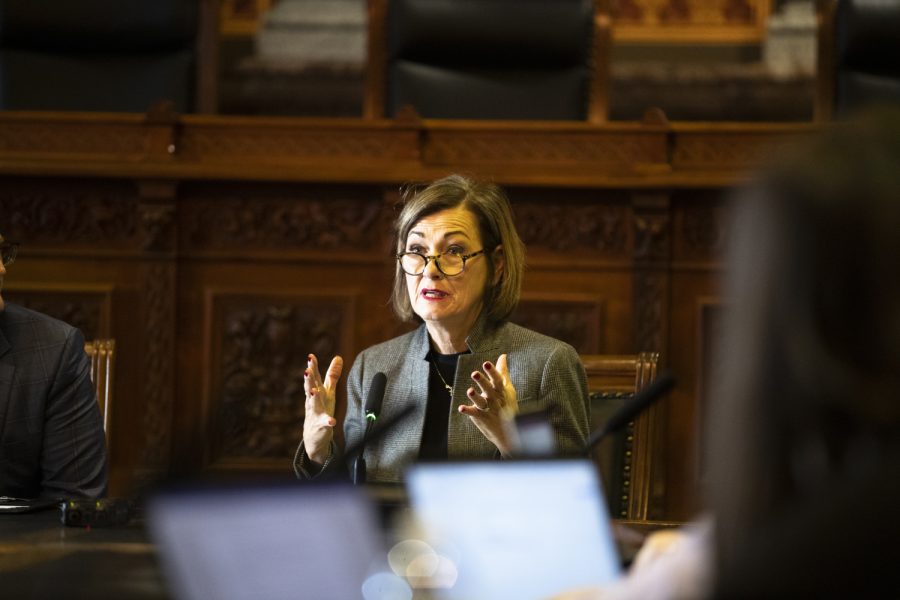Lawmakers push for more transparency on school curriculum ahead of legislative session
Gov. Kim Reynolds said she has been meeting with parents about material they find concerning in public school libraries.
Iowa Gov. Kim Reynolds responds to a reporter’s question at a press conference at the Iowa State Capitol in Des Moines, Iowa on Tuesday, January 4, 2022.
January 4, 2022
DES MOINES — Iowa’s Republican leadership called for more transparency around educational materials and increased parental participation in education during press conferences ahead of the 2022 legislative session.
Chair of the Senate Education Committee Sen. Amy Sinclair, R-Allerton, said on Tuesday that her highest priority going into the new session is working on a parent’s bill of rights to get parents involved with their children’s education.
“Parents have the right to know what their kids are being taught,” Sinclair said. “Parents have the right to access curriculum materials. Parents have the right to make those decisions as far as how and when their child might learn about whatever given issue.”
Sinclair said public school libraries are intended to supplement and support curriculum materials, and can be viewed as part of the state’s curriculum.
“My concerns with public school libraries is that we’re having age appropriate content that’s available to students,” she said.
In November, Senate President Jake Chapman, R-Adel, said in a Facebook post that teachers in the Johnston Community School District were distributing material he deemed obscene, and said he was working to make doing so a felony offense under Iowa Code 728.
Chapman’s comments were in response to a school board meeting on whether to pull the books “The Hate U Give” and “The Absolutely True Diary of a Part-Time Indian” from classrooms. The committee unanimously decided to keep the books. Both of the novels have a young person of color as the protagonist and address race in the story.
House Minority Leader Jennifer Konfrst, D-Windsor Height, said the rhetoric around classroom material is not helpful in addressing the teacher workforce shortage.
“Threatening to put them in jail for example, charging them with felonies for books and also talking about removing books,” Konfrst said. “Remembering that when you remove a book for one child in the library, you’re removing it for every child in the library and you’re making the decision material available for every child who goes to that school.”
Gov. Kim Reynolds said there should be a process in place for parents to receive answers if they have a concern about material. She suggested parents should have access to information that the schools provide to the Department of Education.
“It’s not an extra burden that we’ll be asking them to take on, it’s information that’s already provided,” Reynolds said. “We just need to make that accessible to parents so that they can even have a better idea of what’s available to their kids.”
Reynolds did not cite specific topics or material that should be removed from the libraries, but said “what some of the parents brought forth to me, it’s concerning.”
Reynolds said legislators have and will continue to care for parents on this issue, but said parents will be the ones driving change, not lawmakers.
“They’re paying attention, they’re engaging, they’re showing up at their school boards, they’re talking to the kids and that’s where it should come from,” Reynolds said. “It should be a grassroots effort.”
Reynolds compared the concern parents are showing about material in libraries to concern parents voiced last year about virtual schooling. Early into last year’s legislative session, Reynolds signed a bill into law requiring schools offer a 100 percent in-person learning option.
“I think that’s a dynamic that you’re going to continue to see played out with parents as they continue to really pay attention to what’s happening in our schools – good and bad – and they’ll react accordingly,” Reynolds said.



